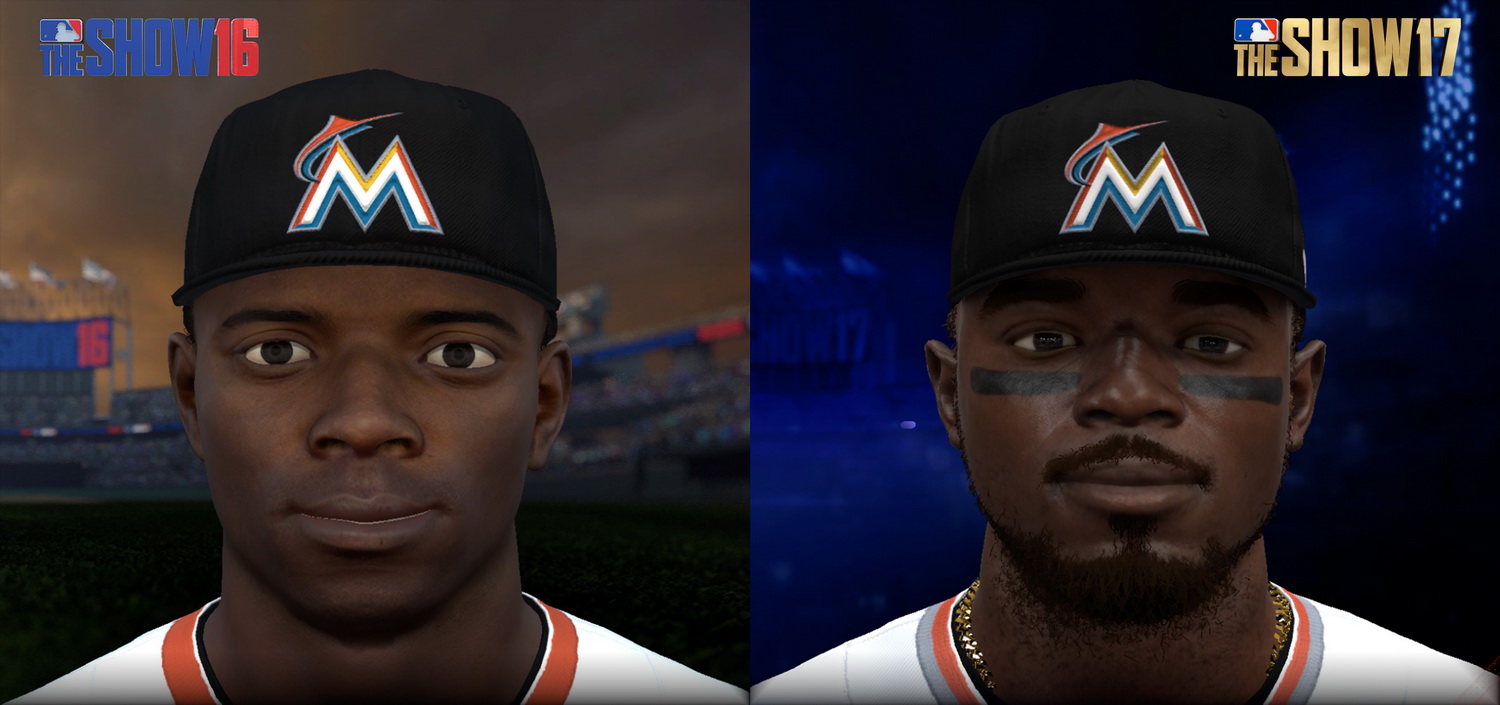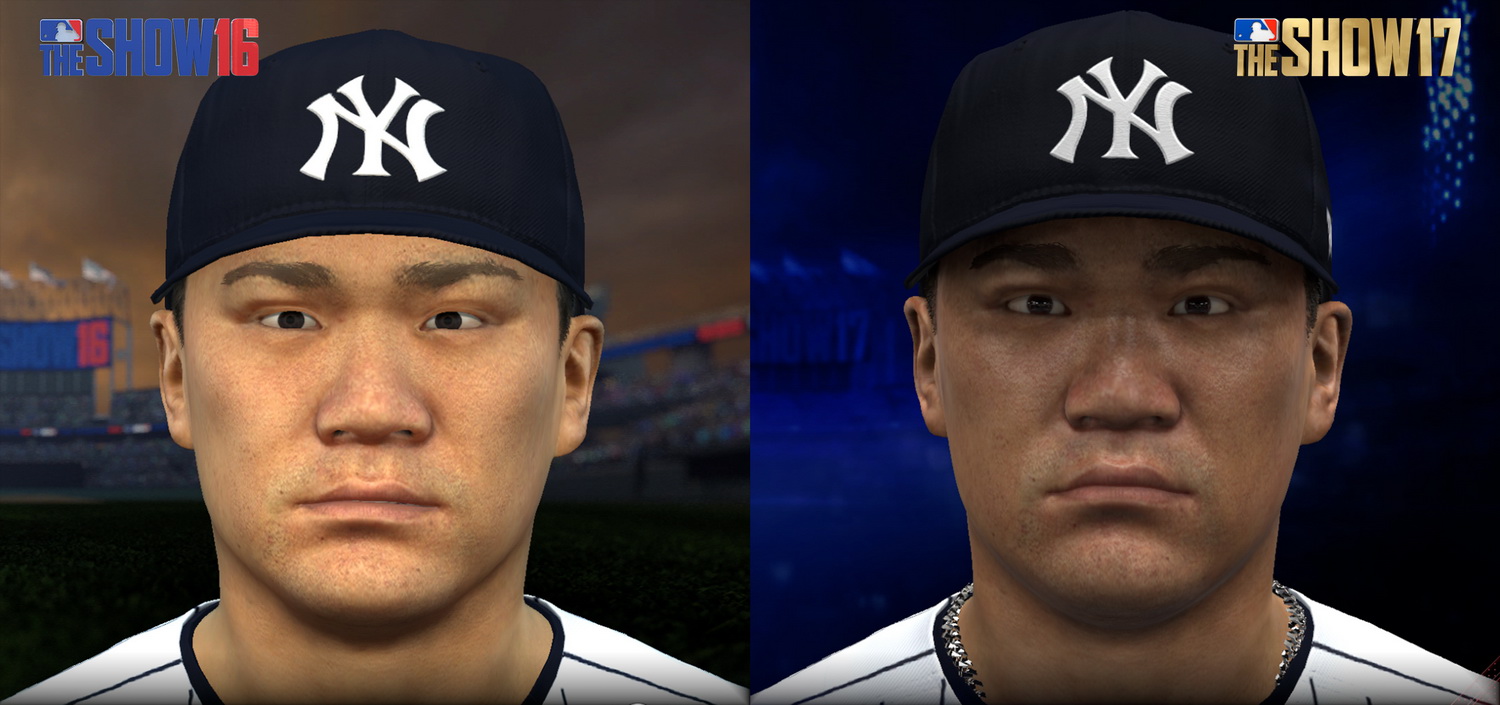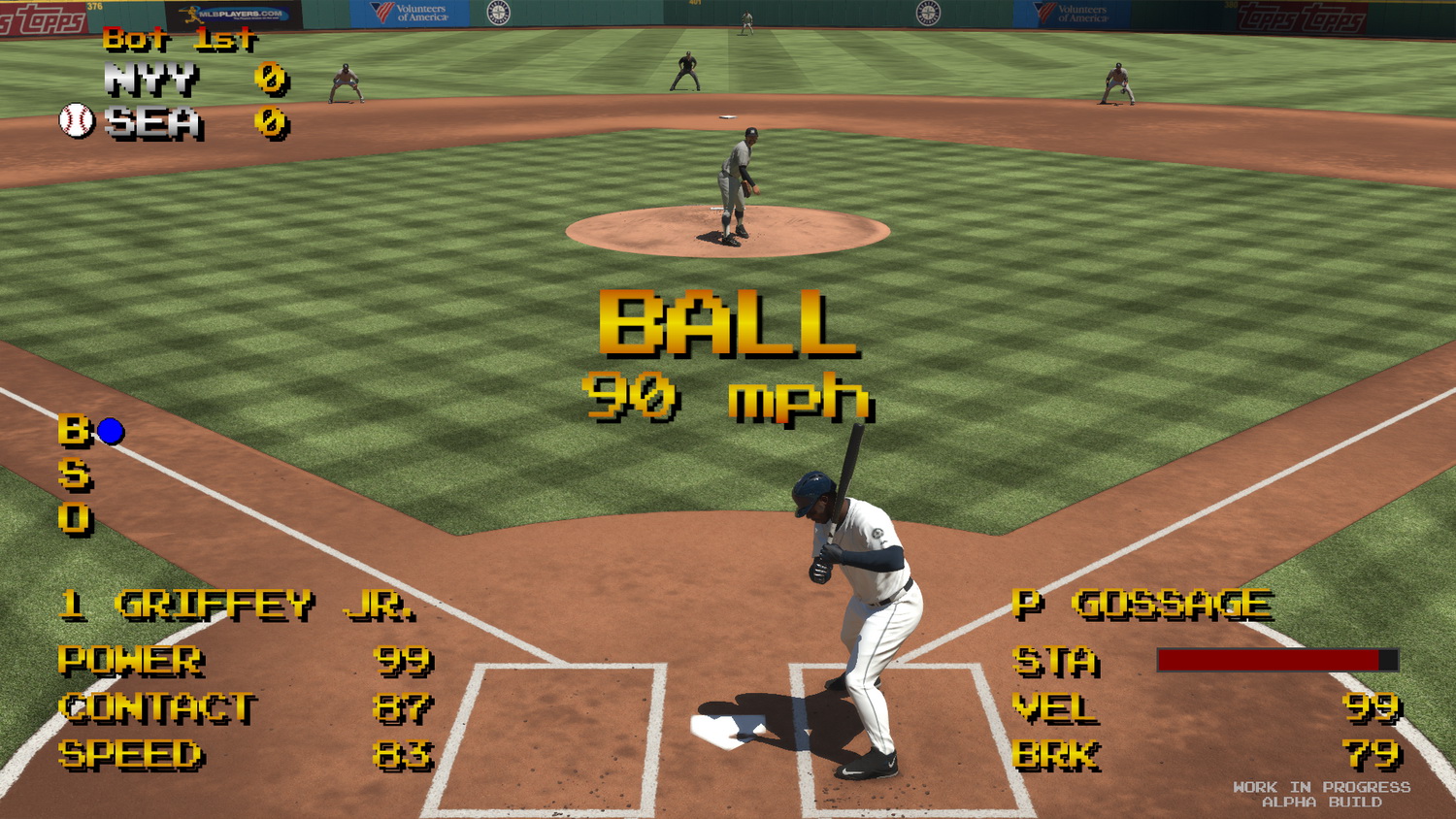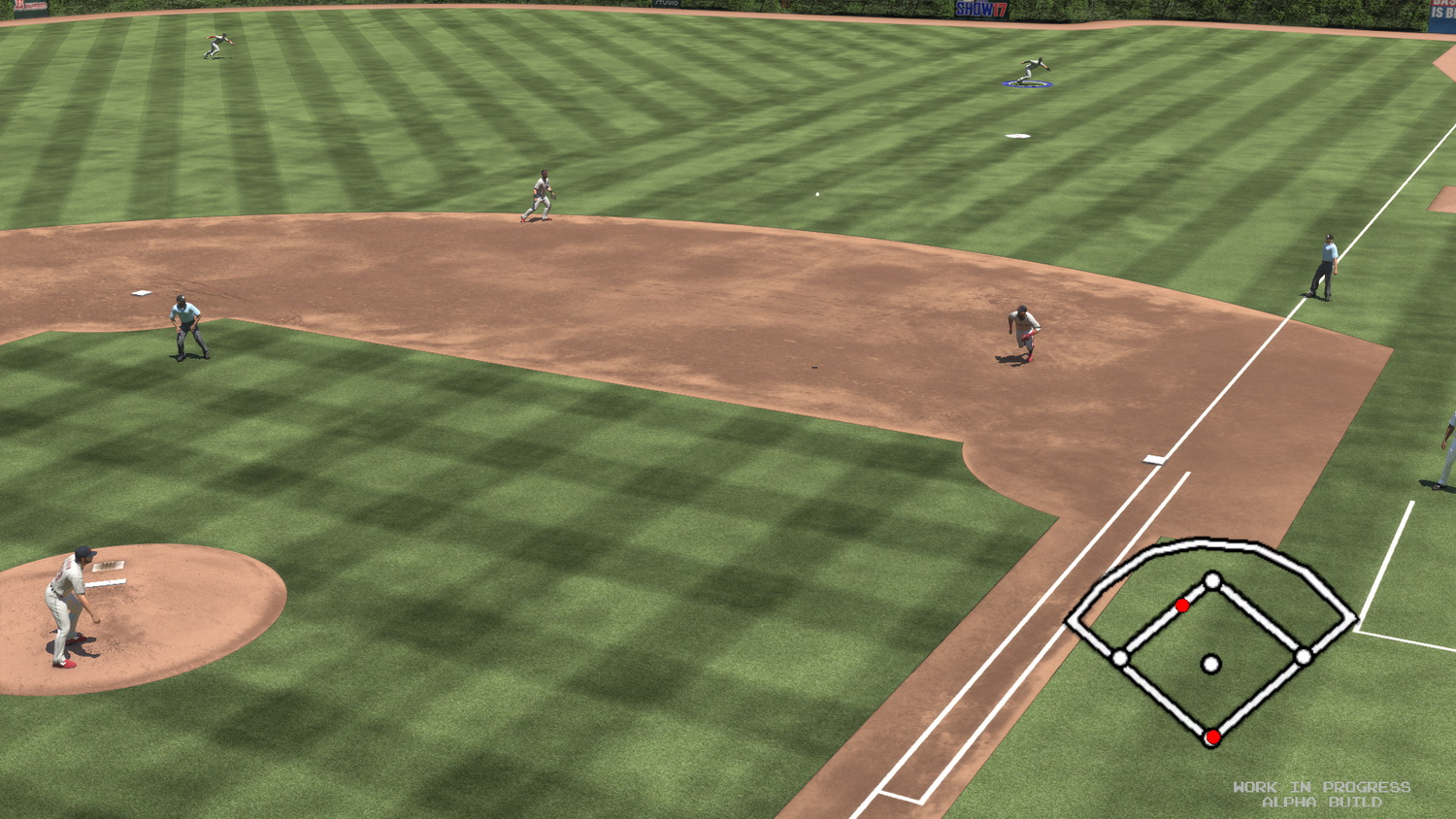- Realistic ball physics
- Thoughtful choice-based system in “Road to the Show” mode
- Critical Situations/Quick Manage let you play when it really counts
- Charming Retro mode
- Poorly written story in “Road to the Show”
Ken Griffey Jr. once said, “You lose, you smile, and you come back the next day. You win, you smile, you come back the next day.” Griffey Jr. graces the cover of this year’s version of the Sony’s Baseball series, MLB The Show 17, and his outlook on the game of baseball aptly embodies the pure joy and satisfaction of playing it. Win or lose, you’ll be back for more.
As a series, The Show has consistently satisfied baseball fans for a decade, so it’s no surprise that The Show 17 is just as impressive. Each year, there are enough tweaks to justify making the jump, and The Show 17 continues the streak. The extraordinary breadth of improvements, which range from improved ball physics to a narrative-forward story mode, brings more progress than what we are used to in a single year from an annual sports game franchise.
Easily the most eclectic entry in the series to date, this trot around the diamond offers incredible depth for baseball aficionados, while making general gameplay even more accessible for casual fans. The Show 17 has an astounding ability to deliver meaningful experiences in both short bursts and over the long-term, without abandoning its pursuit for a more realistic simulation.
Is this real life?
At the core, on-the-field level, The Show series has taken steps over the years to make the virtual game of baseball as close to its real-world counterpart as possible by frequently updating and upgrading player reactions and movements. In The Show 17, ball physics have caught up to the realism of its player models. At the crack of the bat, rather than jetting on a rather straight, but unnatural path, the ball slices and draws, influenced by topspin and backspin, and possesses a more close-to-life hang time — all of which are determined by the contact and angle of the bat at impact.
The change makes both batting and fielding less predictable, thus hewing closer to reality. A line drive that would previously, and unrealistically, tightrope along foul territory can delineate from its path, skipping and veering across the line. Fielders, both player- and AI-controlled, react organically.
Along with realistic mechanics, the game’s new “Showtrack” presentation emulates the presentation of an MLB Network TV broadcast very closely. All the graphs you would see while watching an MLB Network game appear on-screen: If you hit a home run, the replay displays a graph of the launch angle, exit velocity, and hang time. Every aspect of the game’s layout — announcers, scoreboard layout, and music — is dead on. At a glance, a baseball fan might see the game on your TV and might confuse it with the real thing.
Me first or team first, that is the question
The gameplay refinements naturally enhance the game’s create-a-player mode, “Road to the Show,” which has been blown out as a full-fledged story mode. Taking a cue from other sports series, such as FIFA and NBA 2K, The Show 17 has a dynamic narrative that unfolds throughout your humble beginnings as a fledging minor leaguer to your first appearance in the Majors to your possible induction into the Hall of Fame.
A fan might see the game on your TV and might confuse it with the real thing.
The game’s narrative unfolds during dialogue sequences, called “pave your path” moments, where you make personal decisions that affect the clubhouse. You can choose to be “me first,” and protect your career, or “team first” and make a sacrifice for the sake of the team.
For example, you may be called into your manager’s office to discuss a position change from infield to outfield. If you agree, you might find your way up to the Majors quicker, but at the expense of your chosen position. On the other hand, if you refuse, might not get as much time on the field if a teammate outperforms you at your position.
After showing resistance to switching from shortstop to left fielder, our manager asked which position we’d like to play instead. We decided to throw him for a loop and chose starting pitcher, to which he responded dismissively, and benched us for the first time that season.
Your career trajectory primarily comes down to how you play on the field, but your off-the-field choices add a layer of depth and consequence that feels personal. Sometimes the decisions you make off the field have just as big an impact as anything else, and that prospect makes the Road to the Show arc feel like a more believable take of the dream.
While it’s a very clever system, the actual narrative and mechanics of the “pave your path” conversations are not executed well. Rather than simply watching an animated sequence and making a choice, as you would in a dialogue-heavy games like Horizon: Zero Dawn or Mass Effect: Andromeda, “pave your path” features a silent animated sequence with subtitles, while a narrator occasionally drops in to describe the events of the scene.
It doesn’t help that many components of these scenes are poorly executed. The voice that narrates your ascent from scouting day delivers his lines in a monotonous, detached manner better suited for a Discovery Channel nature documentary. Bland, visually unimpressive cutscenes have been a problem for the The Show series all along, so it isn’t too surprising that the game would falter here, especially on developer Sony San Diego’s first try.
Despite its aesthetic issues, the “pave your path” sequences make Road to the Show more engaging than ever. It isn’t necessary for a narrator to get us excited. The choice itself — and all the gameplay around it — is already engaging enough.
Clever, addictive alternatives in franchise mode
Road to the Show has become such a standout feature in The Show series, but the game’s traditional franchise mode also features new mechanics specifically made to help you speed through the long, winding season.
This trot around the diamond offers incredible depth for baseball aficionados.
Baseball seasons are the longest in professional sports, and even in video game format, fatigue can set in. Many users simulate portions of a season to get closer to the pivotal games sooner. For those of you who want to speed up the season, but feel torn about whether or not to simulate games, there’s “Critical Situations,” a new mechanic that gives you unique control over big moments in simulated games. After simulating a game, you’re given the option to step into the batter’s box in a high-pressure situation to knock in the tying run, or take the mound to throw an inning ending strikeout. It’s well implemented, and lets you get through even the boring stuff while retaining some ownership of the entire season.
Another feature, “Quick Manage,” let’s you control the game from the perspective of a manger, similar to text-based baseball sims like Out of the Park Baseball. Rather than controlling every player, you make managerial decisions with each play, telling batters to swing, bunt, and steal, and controlling how your pitchers deal with opposing batters. Each game lasts about five minutes. It’s a brisk, oddly satisfying text-oriented experience with a clean interface for those interested in making big picture decisions. Plus, if don’t like what’s going down on the diamond, you can hop in and take direct control for the rest of the game.
Back to the basics
The Show 17 gives you a bevy of options for approaching each and every game. Retro mode, a wholly new way to play, adds a one-button control scheme similar to old-school baseball games with an 8-bit overlay and 8-bit sounds.
The visuals still look current-gen, but classic fixtures like sliding your batter about the box and moving your pitcher across the mound — depicted as if the player is floating in mid-air — capture the simplistic nature of baseball games circa the ‘90s. You can even control the ball’s movement mid-flight when pitching.
While the mode is really geared towards players who remember the good ‘ol days of baseball games, it also makes for the most accessible version of the game yet. Though it is a nostalgia-driven idea, The Show’s patented fluid on the field gameplay, from running the bases to fielding, is still very much present. The rapid pace fits right in with the overall considerations that went into the game’s new additions, while offering a charming experience outside of the hyper-realism of the rest of the package.
Chock-full of baseball goodness
In addition to all of the actual baseball, The Show’s trading-card-based mode, Diamond Dynasty mode, is considerably larger. The fantasy baseball-esque romp now lets you assemble a team of 25-players from a collection of 2,000 cards, with 30 new legends coming into the fray. Whether you choose to duke it out online or against a computer, take part in the double-elimination Battle Royale, or send your fantasy squad onto the battlegrounds in the Risk-like Conquest mode to spread your national fanbase, there’s something for everyone. Events, new time-specific challenges, force you to assemble a team with a set of thematic parameters.
Our Take
At this point, it’s expected that the latest iteration of The Show will take over as the premiere baseball game, but The Show 17 goes above and beyond. Its incremental improvements to the overall gameplay make it the most realistic baseball sim to date. This year especially, though, Sony has elevated the game with major updates and new modes. With an emphasis on respecting your time, The Show 17 manages to be the deepest baseball simulation yet, as well as the most accessible.
Is there a better alternative?
No, MLB The Show 17 only competes with its predecessors. Once you try it, you won’t want to go back to previous iterations.
How long will it last?
Like most sports games, MLB The Show 17 will keep you busy until you get bored of playing baseball. Many baseball fans could play it regularly until The Show 18 comes out next year and never lose interest.
Should you buy it?
If you’re even remotely interested in baseball, yes, The Show 17 is well worth the investment.
Updated on 03-29-2017 by Steven Petite: Corrected to reflect that Ken Griffey Jr. is playable in Home Run Derby














